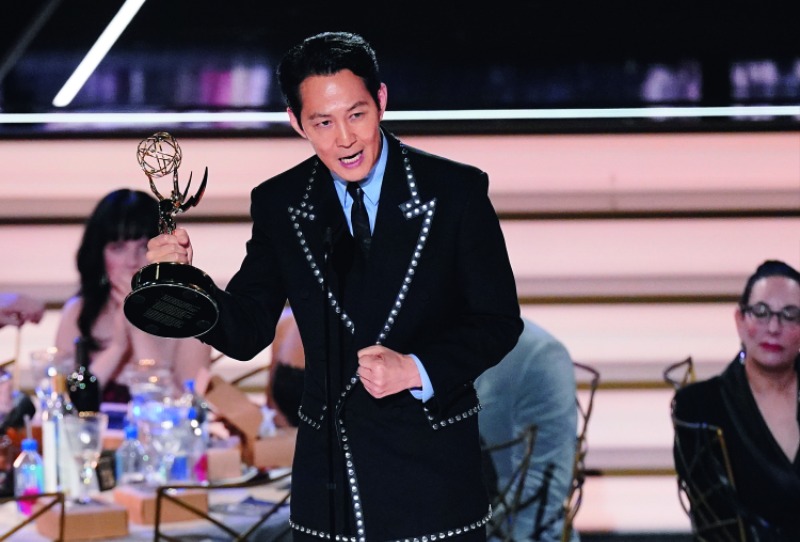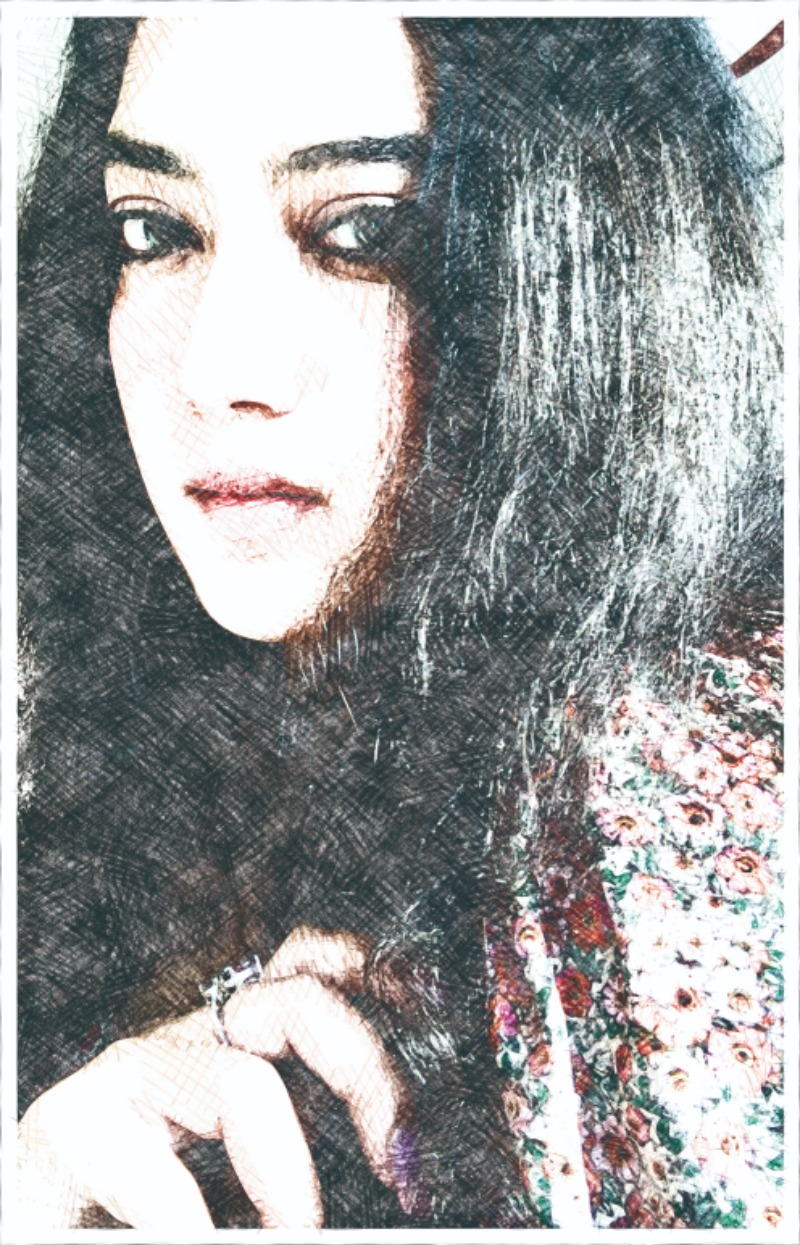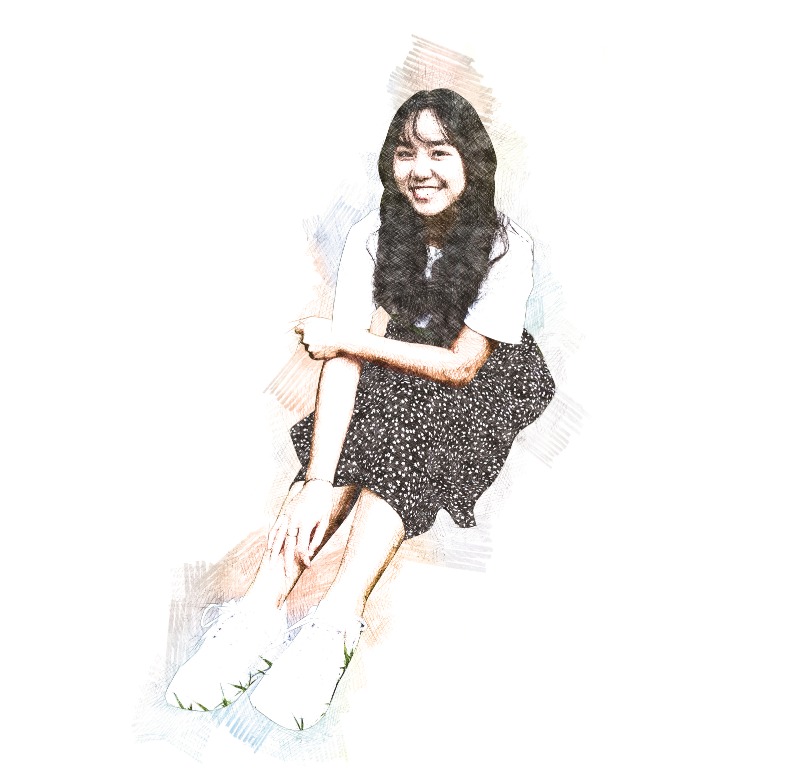There was a time when K-dramas had to be described using terms such as Korean “soap operas” or “series” or “mini-series,” but now they form a distinct category of their own. Pierce Conran, who writes about film and television, explores reasons for their popularity, and some international fans also give their views.

Lee Jung-jae gives his acceptance speech after winning the award for Outstanding Lead Actor in a Drama Series for his role in “Squid Game” at the 74th Emmy Awards, held at the Microsoft Theater in Los Angeles on September 12, 2022.
© YonhapNews
No matter the era, no matter the country, and no matter the medium, the most successful films and TV shows around the world have mostly served one basic function: providing escapist pleasure. This, for most viewers, is the primary function that entertainment serves in their busy and stressful lives.
Yet South Korea, one of the world’s top entertainment purveyors, is a bit of an anomaly in this sense. The list of box office hits partly reads like chapters in a tragic history book, while many of the TV dramas that break out internationally are dystopian tales foregrounding social inequality.
Western audiences have long looked to foreign markets (particularly Asian ones) for very specific forms of entertainment. In the 1970s, Hong Kong exported kung fu films, for example. More recently, Iran has become known to arthouse audiences for its sophisticated dramas.
But what about Korea? At the risk of pigeonholing other national industries, the Korean market has, for close to three decades, fostered a reputation for being endlessly dynamic. It is never any one thing and always in flux. No one knows what the next big thing will look like, which only adds to the industry’s allure of unpredictability.
While the styles and genres cycle at a furious speed, however, there are a couple of things that bind most Korean stories together. Chief among these is the desire to cast a mirror on society, whatever it may look like at that moment in time.
Six years ago, such attempts resulted in the global zombie smash “Train to Busan,” which weaved mayhem and pointed social allegory in a genre that had heretofore been anathema to the market. Three years after that, two things happened: Netflix launched its Korean original operations with the hit period zombie show “Kingdom,” and Bong Joon-ho conquered Cannes (and eventually the Academy Awards stage) with his acclaimed social parable “Parasite.”
In 2021, “Squid Game” did the unthinkable again, turning a grisly death-match drama into the most successful Netflix series of all time. With sophisticated production, genre thrills and digestible social themes that tap into global discontent, Korean content had finally gone truly global.
But diehard K-drama fans will balk at the suggestion that glossy genre series like “Kingdom” or “Squid Game” are what turned the K-drama medium into a global powerhouse. On the domestic front, Korean TV series have been spectacularly successful for decades, but they have also maintained a strong international contingent of fans for almost as long.
Near the start of the millennium, K-dramas were very popular in Japan, driving a wave of tourism as Japanese viewers travelled around the Korean Peninsula and Jeju Island to visit famous K-drama locations. This was when the industry was dominated by romcoms, melodramas and period dramas. The popularity of K-dramas spread to the rest of Asia, and, through pockets of Korean expats around the world, soon grew beyond the continent.
What has changed between then and now is the audience. The diehard fans of classic K-dramas, a bloc that had been steadily growing throughout the 2000s, was joined by a new group owing to the recent wave of Korean crossover hits, which has spurred different kinds of viewers to take a chance on Korean content.
These new K-drama viewers, who came in for the lavish and shocking dystopias, have now grown accustomed to the Korean screen culture. Now, anything Korean might draw their notice on Netflix, whereas earlier, the streamer’s algorithms would have kept K-dramas off their homepages.
In essence, the success of the attention-grabbing social genre series has opened the doors to an even broader audience that has come to embrace the softer pleasures of traditional K-dramas, spawning new international hits like “Crash Landing on You,” “Hometown Cha-Cha-Cha” and “Extraordinary Attorney Woo.”
With Western media dominated by superheroes and space operas, as well as socially minded “elevated horror,” Korean media is now filling a need that Hollywood has struggled to satisfy of late – feel-good content. In these troubled times of pandemics, wars and financial insecurity, viewers have been thirsting for gentle escapism, which traditional K-drama provides in spades.
Viewers around the world are now long familiar with Korean content. What the legions of recent converts may not realize is that the industry has continually been evolving to accommodate them. Violent shows like “Sweet Home,” “Squid Game” and “All of Us Are Dead” often receive lukewarm reactions when they launch at home. It is the strong international reaction to these shows that forces local viewers to reevaluate them and, in turn, inspires the industry to create more similar content.
On the other hand, many K-drama fans are quite conservative, particularly in Muslim countries like Indonesia. It is audiences in these countries that ensure that star-driven old-school romance remains chaste.
But just as the Hollywood dream can easily be broken, the image of Korea seen in K-dramas, with its bright colors, tailored frocks and beautiful stars, is also one that can be shattered. Today, with pandemic travel restrictions all but lifted, tourists are flocking back to Korea in big numbers. The country is also welcoming a new generation of young people from other countries who grew up enjoying K-content. Yet for some, it has been an eye-opening experience.
The reality of working for Korean companies (let alone navigating the local dating scene) could hardly be any more different from the candy-colored and ice Americano-fueled workplaces seen in K-dramas. Korean dramas are enjoyable and addictive, but they are precisely so because they’ve been designed as escapist entertainment. We can escape to these fantasy lands in our minds, but not in the real world.
What the Viewers Say…
Nida Karim
Age 32, Indian in Korea

Q. How did you get interested in Korean dramas?
When I was in high-school, I ran out of Hollywood romantic comedies to watch and turned to Hallyu. After loving movies like “200 Pounds Beauty,” “My Sassy Girl” and “My Little Bride,” I kept wanting more, and watching K-dramas was a natural progression. I was excited to see the romcoms last 16-20 episodes instead of two hours like movies, and since then there was no turning back.
Q. What type of Korean dramas do you like?
Romantic comedies are my favorite genre. Love stories in K-dramas tend to be clean and pure. They don’t necessarily reflect real life romances, but it’s definitely what we all wish real-life romances would be like. I think they play into the fantasy we have, of love blooming in unexpected places and circumstances. They give people reason to believe in love, and that is an addictive feeling.
Q. How do Korean dramas compare with Indian dramas?
At the core of it, I feel Indian dramas and Korean dramas are extremely similar. The stories in Indian dramas are executed in traditional settings, which makes it hard for people to relate, while Korean dramas have managed to make them universally relatable. I hope Indian dramas can also evolve to show more relatable content like Korean dramas in the future.
Q. What’s your favorite?
“Reply 1988.” The human relationships portrayed feel so real, they could be people from our own neighborhood, no matter which part of the world we live in. Though I love fantasy dramas like “My Love from the Star” and “A Korean Odyssey,” it’s “Reply 1988” that has my heart.
Q. Korean society in dramas vs. real life?
The innocence of the dramas is not real. Korean society is made of real people with real-life struggles. Many foreigner friends come to Korea hoping for the perfect K-drama life, but I have seen them fall into depression because rich chaebol are not falling at their feet like “The Heirs,” or solving all their problems like “Boys Over Flowers.” And so many times girls get played over by the search for their K-drama “oppa.” I hope everyone can realize that dramas are beautiful entertainment and hope for the fantasy world.
Bridget McKeon
Age: 36, Australia

Q. How did you get interested in K-dramas?
I was looking for new content on Netflix and after watching a J-drama the algorithm suggested “Boys Over Flowers” and I was hooked. Then I just started going through the library on Netflix, and since then I have noticed that they are rising in prominence as they are available on Prime and Disney+ too.
Q. What do you think is the global appeal?
The production quality is really high for most of the shows. The series are constructed well, including a cliffhanger at the end of each episode that sucks you in. I also think the majority being single seasons but [having] a longer story arc (16 episodes) means that they are easily consumed, as opposed to bingeing. I like that you only get two a week, so it’s something to look forward to.
Q. What do you like about them personally?
For me, a lot of Western TV is now either reality, very low production value, or extremely confronting (violent, graphic content), so K-dramas, even though touching on serious issues, are a lot less confronting and provide some escapism. The way the writers build up relationships so that you are really invested in the characters is amazing. Quite a few times they make me feel butterflies, and I am only a viewer! The romcoms are often predictable, and that is comforting. I love how they give great insight into another culture that is quite different from my own. Also, I would be amiss if I didn’t mention that everyone is super attractive.
Q. Have they increased your interest in Korean culture?
One hundred percent. I started learning Korean in 2019 as I thought it would be fun to read less subtitles. I have gotten into K-pop (great work-out music) and I go out of my way to try various Korean dishes, and now even keep kimchi in my fridge. My next overseas trip will definitely include South Korea as well.
Q. Favorite K-drama?
I love so many that this is a hard question, but my all-time favorite would have to be “Legend of the Blue Sea.” Lee Min-ho and Jun Ji-hyun are probably my favorite actors, and the mix of comedy, fantasy, and romance is perfect.
Nguyen Thi Thuy Lan
23, Vietnam

Q. How did you get interested in Korean dramas?
When I was in elementary school, the Korean Wave began to hit Vietnam. At that time, I didn’t have a cell phone and the internet wasn’t as good as it is now, so I could only watch music programs or cartoons that were broadcast on national television. “Boys Over Flowers” was broadcast around lunchtime every day. It was so famous that everyone in Vietnam knew about it. I was young and not interested in Korean dramas or K-pop, but my brother said, “Why don’t you try watching it? It’s fun and there are a lot of handsome guys in it.” That’s when I became interested in Korean dramas.
Q. What do you find most appealing?
Besides the beautiful settings and the attractive actors, I think the charm of Korean dramas is the content. Through the content, viewers can indirectly learn about the social, cultural, and historical issues of Korea. The dramas also reflect the reality of Korean life. There are many dramas that are based on true stories. So, in addition to romance dramas with interesting plots, I think those that reflect Korean society, history and culture represent the attraction of Korean dramas.
Q. Do they reflect the reality of Korean society?
I think dramas that are about daily life quite closely reflect the reality of Korean society, because there is not much difference between what I saw on television and what I experienced when I was studying in Korea. Watching such dramas, I learned about Korean culture and was able to behave with the proper etiquette in public places. However, there are also dramas that are based on distorted history. Not only Koreans but also many foreigners watch Korean dramas, and as a result I think there are many foreigners who might accept distorted history as fact.
Q. Are Korean dramas popular in Vietnam?
Yes, Korean dramas are popular in Vietnam for various reasons. First, the actors are attractive and good at acting, and there are many beautiful scenes. Many Vietnamese want to travel to Korea because of the beautiful scenery in the dramas. Second, the content is interesting and diverse. Many Korean dramas are aired every year, but each one presents different social issues and meaning. Lastly, watching Korean dramas, especially for those who are learning Korean, is helpful in acquiring knowledge and improving their Korean skills.
Joel D.
Age 71, American in Thailand

Q. How did you get interested in K-dramas?
I was introduced to K-drama by friends in 2006. The first drama they introduced me to (on DVD) was “All In” and that got me hooked. After each episode ended, I would permit myself to watch just one more and suddenly it would be 5 a.m... I still remember the next few I watched as well – “Winter Sonata,” “Lovers in Paris” and “Dae Jang Geum” – all addictively watchable.
Q. What makes them different?
I’ve wondered about this question often. First, the acting. In general, I’m impressed by how expressive Korean actors are. Crying believably, expressing the tangled emotions of falling in love, heartbreak, sorrow and anger are all expressed both believably and dramatically. Second, I think the story arc template, consisting of a finite number of episodes, is different than many Western series that focus on individual episodes. Finally, I think it’s a trademark of many Korean dramas to provide surprising and interesting plot twists that really keep the viewer engaged.
Q. Are you satisfied with the subtitles?
Sadly, my Korean is not sufficient to understand K-dramas without subtitles. I can catch words and phrases, however. I am interested in the art of translation and the question of how much of the original culture through language (i.e. literal translation) should be kept, and how much should be translated into the target language’s standard usage. I always notice terms of address, for example. Where in English people are generally addressed by their names, Korean often avoids that and uses some sort of title ranging from affectionate (oppa) to somewhat formal (ajeossi, sonsaengnim, seonbae). The subtitles will just substitute the characters’ names, which is a reasonable choice, but I feel that it somewhat distorts the nature of Korean interpersonal relationships and makes them seem more American or European.
Q. How important is the music?
This depends on the drama, and I think this has changed somewhat over the years. I mentioned “All In” and “Winter Sonata” – the music remains a crucial element of my memory of them. I almost always find it affecting that music, particularly K-pop, is often incorporated as part of K-dramas, not just as background. Characters often sing in noraebang, and the songs they sing and how well they sing them usually contribute to character development and character interactions. The “Reply” series (1997, 1994, etc.) used the pop music of the time as a focal point. I wasn’t familiar with the singers and yet could identify with the characters in their roles as fans.
Pierce ConranFilm critic and journalist